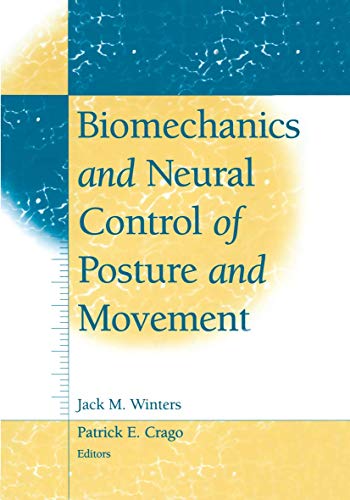Articoli correlati a Biomechanics and Neural Control of Posture and Movement

Le informazioni nella sezione "Riassunto" possono far riferimento a edizioni diverse di questo titolo.
Le informazioni nella sezione "Su questo libro" possono far riferimento a edizioni diverse di questo titolo.
- EditoreSpringer New York
- Data di pubblicazione2000
- ISBN 10 146127415X
- ISBN 13 9781461274155
- RilegaturaCopertina flessibile
- Numero di pagine708
Compra nuovo
Scopri di più su questo articolo
Spese di spedizione:
GRATIS
In U.S.A.
I migliori risultati di ricerca su AbeBooks
Biomechanics and Neural Control of Posture and Movement [Paperback ]
Descrizione libro Soft Cover. Condizione: new. Codice articolo 9781461274155
Biomechanics and Neural Control of Posture and Movement
Descrizione libro Condizione: New. Codice articolo 4190031
Biomechanics and Neural Control of Posture and Movement
Descrizione libro Condizione: New. Codice articolo ABLIING23Mar2716030028814
Biomechanics and Neural Control of Posture and Movement
Print on DemandDescrizione libro Condizione: New. PRINT ON DEMAND Book; New; Fast Shipping from the UK. No. book. Codice articolo ria9781461274155_lsuk
Biomechanics and Neural Control of Posture and Movement
Descrizione libro Taschenbuch. Condizione: Neu. This item is printed on demand - it takes 3-4 days longer - Neuware -Most routine motor tasks are complex, involving load transmission through out the body, intricate balance, and eye-head-shoulder-hand-torso-leg coor dination. The quest toward understanding how we perform such tasks with skill and grace, often in the presence of unpredictable perturbations, has a long history. This book arose from the Ninth Engineering Foundation Con ference on Biomechanics and Neural Control of Movement, held in Deer Creek, Ohio, in June 1996. This unique conference, which has met every 2 to 4 years since the late 1960s, is well known for its informal format that promotes high-level, up-to-date discussions on the key issues in the field. The intent is to capture the high quality ofthe knowledge and discourse that is an integral part of this conference series. The book is organized into ten sections. Section I provides a brief intro duction to the terminology and conceptual foundations of the field of move ment science; it is intended primarily for students. All but two of the re maining nine sections share a common format: (l) a designated section editor; (2) an introductory didactic chapter, solicited from recognized lead ers; and (3) three to six state-of-the-art perspective chapters. Some per spective chapters are followed by commentaries by selected experts that provide balance and insight. Section VI is the largest section, and it con sists of nine perspective chapters without commentaries. 708 pp. Englisch. Codice articolo 9781461274155
Biomechanics and Neural Control of Posture and Movement
Descrizione libro Taschenbuch. Condizione: Neu. Druck auf Anfrage Neuware - Printed after ordering - Most routine motor tasks are complex, involving load transmission through out the body, intricate balance, and eye-head-shoulder-hand-torso-leg coor dination. The quest toward understanding how we perform such tasks with skill and grace, often in the presence of unpredictable perturbations, has a long history. This book arose from the Ninth Engineering Foundation Con ference on Biomechanics and Neural Control of Movement, held in Deer Creek, Ohio, in June 1996. This unique conference, which has met every 2 to 4 years since the late 1960s, is well known for its informal format that promotes high-level, up-to-date discussions on the key issues in the field. The intent is to capture the high quality ofthe knowledge and discourse that is an integral part of this conference series. The book is organized into ten sections. Section I provides a brief intro duction to the terminology and conceptual foundations of the field of move ment science; it is intended primarily for students. All but two of the re maining nine sections share a common format: (l) a designated section editor; (2) an introductory didactic chapter, solicited from recognized lead ers; and (3) three to six state-of-the-art perspective chapters. Some per spective chapters are followed by commentaries by selected experts that provide balance and insight. Section VI is the largest section, and it con sists of nine perspective chapters without commentaries. Codice articolo 9781461274155
Biomechanics and Neural Control of Posture and Movement
Descrizione libro Paperback. Condizione: Brand New. reprint edition. 683 pages. 9.75x6.75x1.25 inches. In Stock. Codice articolo x-146127415X
Biomechanics and Neural Control of Posture and Movement
Descrizione libro Paperback. Condizione: New. New. book. Codice articolo D8S0-3-M-146127415X-6

